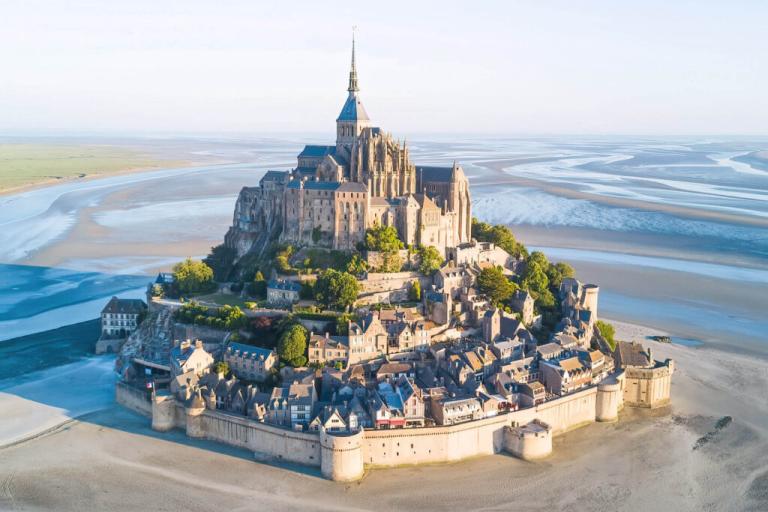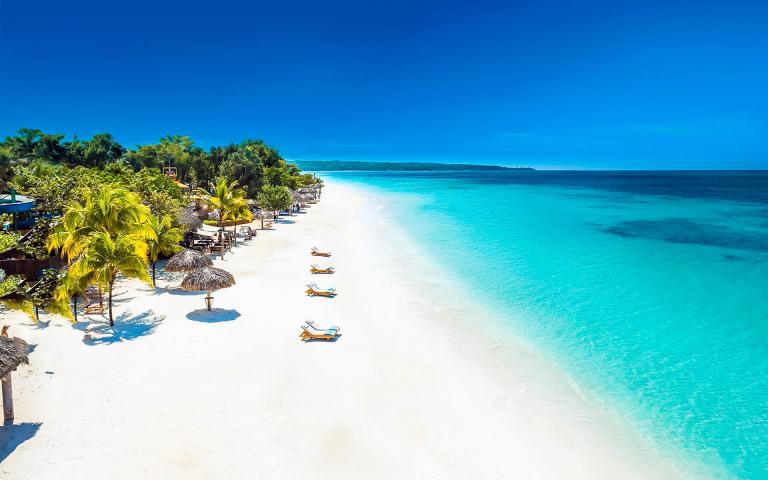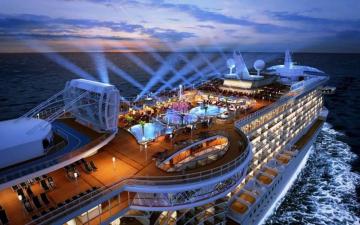Home France is recognized for its significant cultural heritage, exceptional cuisine, and attractive landscapes, making it the most visited country in the world. From seeing…


Negril, a compact yet extensively spread beach resort and town, is situated in the scenic parishes of Westmoreland and Hanover at the extreme western end of Jamaica. Negril, situated around 80.8 kilometers (50.2 miles) southwest of Sangster International Airport in Montego Bay, is a sanctuary for vacationers in pursuit of sun, beach, and tranquility.
Westmoreland, the westernmost parish of Jamaica, is located on the southern half of the island. It includes downtown Negril, the West End cliff resorts to the south, and the southern segment of the famous Seven Mile Beach. This beach, a notable attraction, extends around 11 kilometers (7 miles) and is segmented into two bays: Bloody Bay to the north and Long Bay to the south. The northernmost resorts are situated along Negril Beach, along to the boundary of Westmoreland and Hanover Parish. The closest significant town is Savanna-la-Mar, the capital of Westmoreland Parish, situated to the southwest. Lucea, the capital of Hanover, is situated in the other direction along the A1 highway.
The metamorphosis of Negril into a resort destination started in the late 1950s. Access to the region was once difficult since ships deposited people in Negril Bay, necessitating them wading to shore. The enhancement of the roadway between Montego Bay and Negril in the early 1970s markedly elevated Negril’s prominence as a tourist destination. This two-lane asphalt road extended around 100 yards (91 meters) inland from two white coral sand beaches, next to a tiny settlement at the southern terminus. The road stretched north to Green Island, which housed several Jamaican laborers from Negril, and was sufficiently straight to serve as a runway for light aircraft. Railroad tracks were constructed along the roadway to dissuade drug traffickers from stopping to collect inexpensive shipments of marijuana.
In 1976, the Negril Aerodrome was established at Rutland Point to support the expanding infrastructure necessitated by the rising number of resorts and people in Negril. This little airstrip, in conjunction with other small motels, mostly served North American winter travelers. Europeans congregated in Negril, leading to the establishment of hotels tailored to their requirements.
Negril’s beach has been lauded for years as one of the world’s top ten beaches by several travel publications. The beach is remarkable in length, with Bloody Bay being around 2 miles and Long Bay over 5 miles. Bloody Bay hosts extensive all-inclusive resorts, while Long Bay comprises a combination of all-inclusives and smaller, family-operated hotels.
West End Road, frequently referred to as the West End, is situated south of downtown Negril. This region features resorts that provide more solitude and access to waterways suitable for snorkeling and diving. The cliffs at the West End offer jumping places exceeding 40 feet (12 meters), introducing an adventurous aspect to the tranquil environment.
The beach resorts are encircled by various vendors and stores, primarily situated at the southern end of the beach, where all-inclusive resorts are less prevalent. The lively marketplace ambiance enhances the allure and attractiveness of Negril.
The development of a new roadway from Montego Bay and other infrastructural enhancements may further entice tourists to Negril. As a result, an increasing number of hotels and tour operators are creating new attractions and excursions to accommodate the rising influx of guests.
In recent years, much construction has occurred along the shore. Prominent resorts comprise Couples Swept Away, Couples Negril, Sandals, Beaches, Samsara Hotel, Legends Resort, Grand Lido, Riu Palace Tropical Bay, Riu Club Hotel, and Hedonism II. The Hedonism II resort is a renowned adult destination, recognized for its lasting allure.
Negril’s transformation from an isolated fishing village to a vibrant resort town exemplifies its natural splendor and the appeal of its unspoiled beaches. Negril, with its extensive history, dynamic culture, and varied lodging options, consistently enchants global tourists by providing a distinctive combination of leisure and excitement.
Currency
Capital
Calling code
Population
Area
Official language
Elevation
Time zone
Negril is a gorgeous town that is well-known for its breathtaking beaches, colorful culture, and laid-back lifestyle. It is located on the westernmost coast of Jamaica. This picturesque location, which is sometimes referred to as the “Capital of Casual,” enjoys a fascinating history that extends back to the 17th century, when it was a shelter for pirates seeking to escape from their captors. Because of its beautiful seven-mile beach, spectacular cliffs, and crystal-clear seas, Negril has been a popular tourist destination throughout the course of the years. It has attracted people from all over the world.
The primary attractions of Negril are as varied as they are compelling with their variety. It is possible to have a wide variety of experiences, ranging from the spectacular sunsets at Rick’s Cafe, where brave cliff divers plunge into the blue sea, to the tranquil beauty of the Royal Palm Reserve. There is no shortage of opportunities to have these kinds of experiences. When compared to the peaceful mornings spent snorkeling or exploring the coral reefs, the town’s boisterous nighttime, which features reggae music and lively beach bars, provides the ideal contrast.
There is something for everyone to enjoy at Negril, which is a place that is both distinctive and appealing. It doesn’t matter if you’re looking for excitement, leisure, or a taste of genuine Jamaican culture; this coastal jewel guarantees that you will have an experience that you will never forget.
The beaches of Negril are exceptional, providing a tranquil retreat for individuals in search of sun, sand, and sea. The highlight is clearly Seven Mile Beach, a segment of fine white sand that gracefully arcs along the cerulean waves of the Caribbean Sea. This beach is a sanctuary for sunbathers, swimmers, and water sports aficionados. The tranquil, shallow waves render it suitable for families, while the abundant beachside cafés and restaurants offer an excellent venue to savor a cool beverage or a delectable meal with a scenic view.
Located just north of Seven Mile Beach, Bloody Bay offers a more private and serene option. This crescent-shaped bay is bordered by verdant foliage and provides a more tranquil, personal beach experience. The waters here are equally enticing, ideal for a leisurely swim or a tranquil kayak. The southern cliffs of Negril present a striking juxtaposition to the sandy shores. These formidable limestone rocks ascend dramatically from the sea, offering breathtaking views and a feeling of adventure. The cliffs also harbor several little bays and concealed beaches, reachable just by boat or a bold ascent.
Negril’s coral reefs constitute an essential aspect of its natural allure, brimming with diverse marine fauna and providing premier snorkeling and diving experiences in the Caribbean. These aquatic gardens have a stunning variety of coral species, ranging from fragile sea fans to resilient brain corals. The reefs provide as a refuge for several marine organisms, including vibrant tropical fish, elegant sea turtles, and secretive moray eels. Exploring these reefs is akin to entering a another realm, where the hues and motions of the water manifest in a captivating display.
In addition to the beaches and reefs, Negril’s jungles provide a verdant haven rich in wildlife. These lush woodlands serve as a sanctuary for nature enthusiasts, including towering trees, deep underbrush, and a chorus of avian sounds. Rainforests have a diverse array of plant species, ranging from majestic mahogany trees to fragile orchids. Wildlife enthusiasts may observe several wildlife, including playful monkeys, elusive iguanas, and numerous bird species. Guided tours of these woods offer an opportunity to understand the distinctive flora and wildlife, along with the ecological significance of conserving these natural areas.
Rastafari culture is an intricate part of Negril’s cultural fabric, permeating every aspect of the town’s artistic expression, music, and daily life. Born in Jamaica in the 1930s, the Rastafari movement is more than a faith; it’s a philosophy that promotes peace, honors African history, and encourages people to live in harmony with the environment. From the vibrant paintings that grace the town’s buildings to the infectious reggae music that fills the air, Rastafari’s influence is undeniable in Negril. The cultural landscape of Negril has been forever changed by reggae greats like Bob Marley and Peter Tosh, who were profoundly impacted by Rastafari principles. Local Rastafari communities, reggae concerts, and art galleries featuring Rastafari-inspired artwork provide visitors a chance to fully experience this rich cultural legacy.
Also worth exploring in Negril’s rich history is the influence of the Maroon people. Enslaved Africans who fled plantations and formed autonomous settlements in the mountainous interior of Jamaica are the ancestors of the Maroons. These groups were essential in the fight against colonial control and the preservation of African culture because of their tenacity and passionate independence. There is a strong sense of the Maroon influence in Negril’s music, food, and traditions. Maroon communities have played a key role in preserving traditional African music, dance, and storytelling. Tourists to Negril may immerse themselves in the Maroon culture and history by seeing Maroon communities, attending cultural events, and speaking with local historians who preserve the Maroon narrative.
Colonialism also had an impact on Negril, molding its culture and growth. Plantations and new social and economic systems were among the many changes brought about by the 16th-century entrance of European settlers to the area. The town of Negril has the architectural mark of colonialism, with ruins of houses and fortifications from that time all over the place. Forcible African migration to Jamaica during colonial times also altered the island’s demography and cultural makeup. As a result of its complicated history of colonialism and resistance, Negril’s culture today is a lively fusion of indigenous, African, and European elements. Learning more about Negril’s colonial history helps shed light on the cultural development of the town and the resiliency of its inhabitants.
With its abundance of water sports, Negril is a haven for adrenaline junkies and those seeking a more sedate getaway. Visitors may swim or snorkel in the serene, crystal-clear waters of Seven Mile Beach and marvel at the diverse marine life, including exotic corals and brightly colored fish. Scuba diving in Negril is an absolute must for adventure seekers. Underwater caverns and coral reefs provide divers a breathtaking setting, and they may even see rays, sea turtles, and nurse sharks on occasion. Another well-liked pastime is surfing, with Long Bay’s waves being ideal for riders of all skill levels. The warm waters of the Caribbean are home to a variety of game species, including marlin, tuna, and mahi-mahi, so anglers may also enjoy deep-sea fishing expeditions.
Beyond the ocean, visitors to Negril may enjoy the island’s verdant surroundings on foot via its many hiking and nature trip options. Hikers will find the Negril Hills to be an idyllic setting, with paths leading through tropical trees and revealing breathtaking vistas of the coast. Another breathtaking natural feature worth investigating is the Great Morass. Exotic birds, crocodiles, and rare orchids are just a few of the plant and animal species seen on guided excursions of this extraordinary ecosystem. The Royal Palm Reserve is a common stop on these excursions; from its raised boardwalks, visitors can see the wetland’s natural splendor up close.
At night, Negril’s lively nightlife comes to life, providing a wide range of entertainment alternatives to cater to every preference. Live reggae music provides the ideal atmosphere for a night of dancing and mingling at the town’s popular beach pubs and clubs. In addition to its renowned sunset views, Rick’s Cafe is well-known for its exciting ambiance and cliff diving performances. There are a lot of great places to eat and dance the night away, and one of the most well-known is the Jungle Night Club, Sports Bar & Grill. At Alfred’s Ocean Palace, guests may enjoy reggae and other Caribbean music played by live bands on the beach for a more relaxed evening. The evenings in Negril are just as unforgettable as the days, thanks to these and many more establishments.
The varied and flavorful cuisine of Jamaica is a reflection of the island’s cultural wealth and the abundance of its natural ingredients. The cuisine is well-known for its fragrant and savory meals made with fresh ingredients and powerful spices. Because of the availability of fish, shrimp, and lobster in Jamaican seas, seafood is a key component of Jamaican cuisine. Typical regional seasonings for these include thyme, allspice, and the hot Scotch bonnet pepper, which gives many meals their signature spiciness. The end product is an exquisite and varied dining experience.
Street vendors in Negril provide a wide range of tasty and reasonably priced alternatives for anyone seeking a taste of real Jamaican cuisine. Among these, jerk chicken—a slow-cooked dish that uses pimento wood and a fiery mixture of herbs and spices—may be the most well-known. A must-try for any visitor is the smokey, savory food that comes out of it. Jamaican patties, made with flaky pastry and stuffed with spicy meat (often chicken or beef), are another famous street dish. These patties are great for when you’re on the run because they’re both portable and delicious. Even Jamaica’s national meal, ackee and saltfish, is a typical sight at street food stands. A delightful and distinctive flavor of Jamaican cuisine, this dish has salted fish and ackee fruit cooked with onions, peppers, and spices.
Negril is home to several world-class eateries serving up delectable foreign and Jamaican fare for the more discerning diner. Perched on the cliffs above the sea, the Rockhouse Restaurant is famous for its creative meals that combine foreign flavors with local ingredients. Enjoy authentic Jamaican cuisine and fresh seafood in a romantic atmosphere at Ivan’s Bar and Restaurant at Catcha Falling Star. The caverns Restaurant offers an intimate environment amid a network of sea caverns, where diners may savor gourmet dishes made with the freshest local ingredients, for a genuinely sumptuous dining experience. Visitors to Negril may indulge in a varied and unforgettable gastronomic experience at any one of these exquisite dining places or any of the many others around the island.
Negril has a wide range of places to stay, from high-end resorts to cheap guesthouses, so there is something for every type of tourist. Luxury resorts like the Royalton Negril offer the highest level of comfort and amenities. They include stunning views of the sea, a variety of dining choices, and top-notch facilities like swimming pools, spas, and exercise centers. On top of Negril’s hills, the Rockhouse Hotel offers stunning views and a peaceful atmosphere. People who want a high-end, spoiled vacation with all the comforts of home stay at these locations.
Negril has a lot of cheap places to stay that don’t skimp on comfort or charm for tourists on a budget. Guesthouses like the Coco La Palm Seaside Resort are right on Seven Mile Beach and make it easy to get to the beach and other sites in the area. Many of these guesthouses have free Wi-Fi, swimming pools, and restaurants on-site, so you can have a nice stay without spending a lot of money.
If you want a more private and tailored vacation, getting a house or apartment in Negril is a great choice. There are villas like SplashRock Villa and Cool Breeze Negril Villa that are like home but have more privacy and space. People with families or groups of friends will love these homes because they often have private pools, fully stocked kitchens, and beautiful views of the ocean. You can also stay in apartments and houses, which are better for couples or people traveling alone because they are more private. Platforms like Airbnb and Vrbo have a lot of different properties, from houses on the beach to getaways in the hills, so tourists can find the right place to stay for their needs.
Negril also has many camping and eco-tourism choices for visitors who care about the environment. With its lovely cottages and garden rooms, Judy House Cottages and Backpacker Hostel gives guests a one-of-a-kind experience that lets them enjoy the natural beauty of Negril. Camp Cabarita Wellbeing Eco Resort offers a peaceful setting with views of the mountains and meals made with ingredients straight from the farm for a more in-depth ecotourism experience. This eco-resort focuses on being environmentally friendly and provides activities like eco-tours to waterfalls, caves, and springs that bring people closer to nature and encourage responsible tourism.
Negril is reachable by many transportation methods, facilitating effortless access for travelers to this exquisite resort. The predominant method of reaching Negril is via flying into Sangster International Airport in Montego Bay, located around 81 kilometers distant. Travelers can utilize a shuttle, taxi, or private service from the airport to Negril, with the journey often lasting between 60 to 90 minutes. The picturesque route along the northern coastline provides a view of Jamaica’s breathtaking scenery, enhancing the enjoyment of the journey from the outset.
In Negril, navigation is uncomplicated, offering several alternatives to accommodate diverse tastes and financial considerations. Local busses are a favored option for budget-conscious vacationers and anyone want a genuine Jamaican experience. These buses function on designated routes inside Negril and to various locations in Jamaica, offering a vibrant and frequently congested journey. Route taxis, distinguished by their red license plates, provide a cost-effective alternative to private taxis and are suitable for short journeys inside the town. Private taxis provide a more comfortable and convenient alternative, with several drivers also serving as tour guides, imparting useful knowledge about local culture and landmarks.
For individuals who choose greater autonomy, automobile rental is a feasible alternative. Prominent rental firms like as Avis and Budget, together with local agencies, function in Negril. It is essential to possess confidence in your driving abilities, as Jamaican roadways may be small and serpentine. Jamaicans operate vehicles on the left side of the roadway. Alternatively, intrepid guests may like hiring a bicycle or scooter, offering a versatile and thrilling method to navigate Negril at their own leisure. Numerous rental establishments and hotels provide these alternatives; nonetheless, it is imperative to don a helmet and comply with local traffic regulations for safety.
Timing may greatly influence your experience when arranging a trip to Negril. The optimal period for visitation is the dry season, spanning from November to mid-December and from January to April, characterized by agreeable weather and low precipitation. This timeframe corresponds with the high tourist season; thus, it is prudent to reserve lodgings and activities in advance.
When packing for Negril, include lightweight, breathable garments appropriate for the tropical environment. Remember to include basic items such as sunscreen, bug repellant, and a hat for sun protection. Comfortable footwear is essential, particularly if you intend to tour the town or engage in trekking. For aquatic activities, pack swimwear, a snorkel, and aquatic footwear.
Safety is paramount during travel, and Negril is often secure for visitors. Nevertheless, it is prudent to adopt conventional measures. Refrain from wandering alone at night, particularly in less inhabited regions, and consistently utilize licensed taxis. Ensure the security of your assets and exercise caution when utilizing ATMs. Maintaining hydration and consistently applying sunscreen is advisable to safeguard against the tropical sun.
Jamaica is an island nation in the Caribbean Sea and the West Indies, with a population of around 2.8 million individuals. This positions it as the third most populated Anglophone nation in the Americas, subsequent to the United States and Canada,…
Kingston, Jamaica’s dynamic capital and largest city, is on the island’s southeastern coast. The Palisadoes, a long sand spit that connects the ancient town of Port Royal and the Norman Manley International Airport to the rest…
Montego Bay, the dynamic center of St. James parish, serves as a hub of culture and tourism in Jamaica. Montego Bay, the fourth-largest metropolitan region in the country after Kingston, Spanish Town, and Portmore, is integral to the Greater Kingston Metropolitan…
Ocho Rios, commonly referred to as “Ochi” by residents, is a lively town situated in the parish of Saint Ann on Jamaica’s northern coastline. The designation “Ocho Rios” means “Eight Rivers” in Spanish;…
Runaway Bay, situated in Saint Ann Parish on Jamaica’s northern coast, is renowned for its natural beauty. This scenic village, located 16 kilometers west of Ocho Rios and immediately east of Discovery Bay, where Christopher Columbus landed in 1494, is…
Spanish Town, the seat and most populous town in the parish of St. Catherine, Jamaica, is a locale steeped in historical and cultural importance. Located in the ancient county of Middlesex, this town…
Home France is recognized for its significant cultural heritage, exceptional cuisine, and attractive landscapes, making it the most visited country in the world. From seeing…

From Rio's samba spectacle to Venice's masked elegance, explore 10 unique festivals that showcase human creativity, cultural diversity, and the universal spirit of celebration. Uncover…

Millions of visitors come to Spain annually because of its vibrant culture, fascinating past, and amazing scenery. Still, the real spirit of Spain is found…

Boat travel—especially on a cruise—offers a distinctive and all-inclusive vacation. Still, there are benefits and drawbacks to take into account, much as with any kind…

Discover the vibrant nightlife scenes of Europe's most fascinating cities and travel to remember-able destinations! From the vibrant beauty of London to the thrilling energy…

© All Rights Reserved. By Travel S Helper